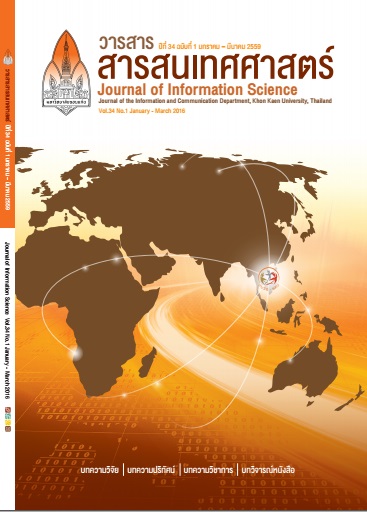การจัดการความรู้สู่แผนชุมชนพึ่งตนเองเพื่อการพัฒนาอย่างยั่งยืนของชุมชนตามแนวชายแดนไทย - กัมพูชา (Knowledge Management towards Self-Reliance Community Planning for Sustainable Development of Thai-Cambodia Border Community)
Keywords:
การจัดการความรู้, แผนชุมชนพึ่งตนเอง, การพัฒนาอย่างยั่งยืน, ชุมชนชายแดนไทย-กัมพูชา, Knowledge Management, Self-reliance Community Planning, Sustainable Development, Thai-Cambodia Border CommunityAbstract
บทคัดยอ การวิจัยนี้มีวัตถุประสงคเพื่อศึกษาบริบท ศักยภาพ ปญหา และความตองการของชุมชนและการจัดการความรู้ แผนชุมชนพึ่งตนเองเพื่อการพัฒนาอย่างยั่งยืนของชุมชน ตามแนวชายแดนไทย-กัมพูชา กลุมตัวอยาง 180 คน รวบรวมขอมูลดวยแบบสอบถามสัมภาษณเจาะลึก และสนทนากลุม วิเคราะหเชิงปริมาณดวยสถิติเชิงพรรณนาและวิเคราะหเชิงคุณภาพดวยการวิเคราะหเนื้อหา ผลการวิจัยพบวา 1) บริบทชุมชนเปนชุมชนอพยพผสมผสานกับชุมชนดั้งเดิม ตั้งถิ่นฐานใกลแนวชายแดนมีศักยภาพโดยรวมในระดับมาก มีปญหาในระดับปานกลาง มีความตองการในการพัฒนาในระดับมาก 2) การจัดการความรูโดย (1) กําหนดความรูจากอัตลักษณชุมชน (2) สรางและแสวงหาความรู จากการฝกอบรม ศึกษาดูงาน (3) จัดเก็บความรู้ไว้กับผู้นำในรูปของความรู้ความจำ (4) กลั่นกรองความรู้ให้เหมาะกับริบทของชุมชน (5) เข้าถึงความรู้จากการประกาศต่างๆ (6) แบ่งปันความรู้กันโดยการเล่าเรื่องพูดคุยแบบไมเปนทางการ และ (7) เรียนรูผานกระบวนการทางสังคมนําไปสูแผนชุมชนพึ่งตนเองเพื่อการพัฒนาอยางยั่งยืน ดานการสรางกระบวนการเรียนรู การบริหารจัดการกองทุนลดรายจายเพิ่มรายได พัฒนาระบบสวัสดิการชุมชน สงเสริมวิสาหกิจชุมชน และพัฒนาเครือขายและประชาสัมพันธเพื่อสรางความเขาใจ Abstract This Participatory Action Research (PAR) describes the application of knowledge management (KM) to the formulation of self-reliant community planning for sustainable development of the Thai-Cambodia border communities. The data was collected from the study sample of 180 people through the questionnaires, in-depth interviews and group discussions. Both quantitative and qualitative statistics were used for the analysis of the collected data. The study findings reveal that 1) the informants migrated to the communities, mixed with native dwellers and settled down along the border. They were found to possess high potentiality and encountered problems at the moderate level, and had great desire for the community development. 2) With regard to knowledge management application in the community development, the analysis of the data revealed that (1) the community members identified the knowledge based on the community conditions, (2) they created and acquired knowledge through trainings and study visits, (3) they stored knowledge with the community leaders in for form of tacit knowledge, (4) they selected and applied the knowledge appropriate to the communities, (5) they accessed knowledge through the announcement boards, (6) they shared knowledge using storytelling and informal discussions, and (7) employing the social learning process, they formulated self-reliant community plans for sustainable development focusing on Community based learning process, community funding management for the revenue increasing and expenditure reduction, community welfare system development, community enterprise promotion and public relation network development and public relation engagement for better understanding.Downloads
Download data is not yet available.
Downloads
Published
2016-05-18
How to Cite
Methawinchayud, K., Phabu, S., & Namwong, R. (2016). การจัดการความรู้สู่แผนชุมชนพึ่งตนเองเพื่อการพัฒนาอย่างยั่งยืนของชุมชนตามแนวชายแดนไทย - กัมพูชา (Knowledge Management towards Self-Reliance Community Planning for Sustainable Development of Thai-Cambodia Border Community). Journal of Information Science Research and Practice, 34(1). retrieved from https://so03.tci-thaijo.org/index.php/jiskku/article/view/56949
Issue
Section
Research Article








